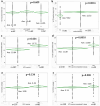Effects of different educational interventions on cervical cancer knowledge and human papillomavirus vaccination uptake among young women in Japan: Preliminary results of a cluster randomized controlled trial
- PMID: 39774513
- PMCID: PMC11706404
- DOI: 10.1371/journal.pone.0311588
Effects of different educational interventions on cervical cancer knowledge and human papillomavirus vaccination uptake among young women in Japan: Preliminary results of a cluster randomized controlled trial
Abstract
The incidence and mortality rates of cervical cancer are increasing among young Japanese women. In November 2021, the Japanese Ministry of Health, Labour, and Welfare reinstated the active recommendation of the human papillomavirus (HPV) vaccine, after it had been suspended in June 2013 due to reports of adverse reactions. However, vaccine hesitancy is prevalent in the younger generation in Japan. To identify obstacles to vaccine uptake, we conducted a randomized study using different methods to provide educational content to improve health literacy regarding cervical cancer and HPV vaccination among Japanese female students. We surveyed 188 Japanese female students, divided into three groups according to the intervention: no intervention, print-based intervention, and social networking service-based intervention. Twenty questionnaires and the Communicative and Critical Health Literacy scales were used as health literacy scales. Participants' knowledge and health literacy improved regardless of the method of education. In fact, participants acquired proper knowledge when given the opportunity to learn about the importance of the disease and its prevention. Therefore, medical professionals in Japan must provide accurate scientific knowledge regarding routine HPV vaccination and the risk of cervical cancer in young women to improve their health literacy and subsequently increase HPV vaccination rates in Japan, which may lead to cervical cancer elimination. Trial registration number: UMIN000036636.
Copyright: © 2025 Takahashi et al. This is an open access article distributed under the terms of the Creative Commons Attribution License, which permits unrestricted use, distribution, and reproduction in any medium, provided the original author and source are credited.
Conflict of interest statement
I have read the journal’s policy and the authors of this manuscript have the following competing interests: This research was funded in part by the Investigator-Initiated Studies Program of Merck Sharp & Dohme Corp. (Kenilworth, NJ, USA) and MSD K.K. (grant number 58246). The opinions expressed in this study are those of the authors and do not necessarily represent those of Merck Sharp & Dohme Corp. or MSD K.K. This does not alter our adherence to PLOS ONE policies on sharing data and materials.
Figures



Similar articles
-
Effect of Different Educational Interventions on Knowledge of HPV Vaccination and Cervical Cancer among Young Women: A Preliminary Report.Int J Environ Res Public Health. 2022 Apr 25;19(9):5191. doi: 10.3390/ijerph19095191. Int J Environ Res Public Health. 2022. PMID: 35564586 Free PMC article.
-
Human Papillomavirus vaccination awareness and uptake among healthcare students in Japan.J Infect Chemother. 2025 Feb;31(2):102554. doi: 10.1016/j.jiac.2024.11.004. Epub 2024 Nov 5. J Infect Chemother. 2025. PMID: 39510445
-
Interventions to improve human papillomavirus vaccination among Chinese female college students: study protocol for a randomized controlled trial.BMC Public Health. 2019 Nov 21;19(1):1546. doi: 10.1186/s12889-019-7903-x. BMC Public Health. 2019. PMID: 31752785 Free PMC article. Clinical Trial.
-
Knowledge and Awareness of Human Papillomavirus Vaccination and Cervical Cancer among Men and Women in Japan: A Questionnaire Survey.Asian Pac J Cancer Prev. 2023 Mar 1;24(3):1063-1071. doi: 10.31557/APJCP.2023.24.3.1063. Asian Pac J Cancer Prev. 2023. PMID: 36974562 Free PMC article.
-
Effectiveness of an Educational Intervention to Increase Human Papillomavirus Knowledge in High-Risk Minority Women.J Low Genit Tract Dis. 2018 Oct;22(4):288-294. doi: 10.1097/LGT.0000000000000386. J Low Genit Tract Dis. 2018. PMID: 29570136
References
-
- World Health Organization (WHO). Cervical cancer [Internet]. https://www.who.int/news-room/fact-sheets/detail/cervical-cancer (accessed on 17 Nov 2023).
-
- Utada M, Chernyavskiy P, Lee WJ, Franceschi S, Sauvaget C, de Gonzalez AB, et al.. Increasing risk of uterine cervical cancer among young Japanese women: Comparison of incidence trends in Japan, South Korea and Japanese-Americans between 1985 and 2012. Int J Cancer. 2019;144: 2144–2152. doi: 10.1002/ijc.32014 - DOI - PMC - PubMed
-
- de Sanjose S, Quint WG, Alemany L, Geraets DT, Klaustermeier JE, Lloveras B, et al.. Retrospective International Survey and HPV Time Trends Study Group. Human papillomavirus genotype attribution in invasive cervical cancer: a retrospective cross-sectional worldwide study. Lancet Oncol. 2010;11: 1048–1056. doi: 10.1016/S1470-2045(10)70230-8 - DOI - PubMed
Publication types
MeSH terms
Substances
LinkOut - more resources
Full Text Sources
Medical

